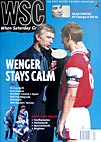 Day 18 of the WSC advent calendar and we are joining Leicester City’s journey following a star. As they prepared, in October 2000, issue 164, to visit Red Star Belgrade, Dragomir Pop-Mitic reported on the civil unrest in Yugoslavia
Day 18 of the WSC advent calendar and we are joining Leicester City’s journey following a star. As they prepared, in October 2000, issue 164, to visit Red Star Belgrade, Dragomir Pop-Mitic reported on the civil unrest in Yugoslavia
“We are ready to organise the match and all Leicester City supporters will be welcomed and completely safe,” said an official from Red Star Belgrade after the UEFA Cup draw was announced. Whether Leicester are able to travel to Yugoslavia remains to be seen, though UEFA have insisted they will forfeit the game if they don’t. The British government may not be prepared to grant permission and the Milosevic regime will be nervous too, since the match will take place a few days after a domestic election which it cannot afford to lose
Football stadiums have long been a venue for demonstrations against Milosevic, but the authorities had never intervened during matches until this season’s European qualifiers. The riot police action during Red Star’s Champions League second qualifying round game against Georgia’s Torpedo Kutaisi came as a complete surprise. The song that caused offence, “Kill yourself and save Serbia, Slobodan”, was not new and a big flag with the words written on it had appeared at several of Yugoslavia’s games at Euro 2000.
Despite the police’s subsequent claim that they were trying to arrest two supporters who had set off fireworks, their action created total chaos which lasted for the whole of the second half. Players admitted they had spent more time watching the battle on the terraces than playing football. Opposition newspapers produced a picture of a policeman aiming a gun, while state television blamed “hooligans” for the trouble. Club president Dragan Dzajic defended the fans and offered to resign but a compromise was found in a formal statement: “Red Star Football Club have nothing in common with some sections of irresponsible supporters.” As a result of the violence the FA publicly announced: “We must stop political propaganda in the grounds. In the future police will intervene whenever necessary.”
Both Partizan and Red Star responded by launching campaigns called “No politics at football matches”. There was a huge irony in their stance. In the communist era Partizan were the club mostly closely associated with the regime, their fans’ chant of “Tito, Party, Black and White Army” expressing their loyalty to the state. Red Star fans, by contrast, were perceived to be Serbian nationalists. Before the break-up of Yugoslavia, Milosevic had allied himself with the nationalist cause and was feted at Red Star home games with chants such as “Star, Star, that’s the Serbian team, Slobodan Milosevic is proud of them”.
When civil war was looming in the early Nineties, the acknowledged leader of the Red Star fans , Zeljko Raznjatovic (“Arkan”), united the various hooligan gangs under his own control. Members of that united supporters group, known as Delije, formed the hardcore of the most infamous paramilitary unit during the Bosnian war, the Tigers, whose activities were closely followed in the official Red Star magazine.
The second leg of Red Star’s Champions League qualifier against Dynamo Kiev was broadcast live 0n Eurosport. All the main opposition leaders attended the match, which they saw as an ideal opportunity to appeal to young, first time voters in the run-up to the elections. Neutrals feared that the regime would welcome another chance to flex its muscles but, contrary to many people’s expectations, the match passed off peacefully. The “Kill yourself” chant was heard only once, in injury time. There were thousands of police outside the ground, but not a single officer in uniform was seen inside.
Like Red Star, Partizan have drawn attractive UEFA Cup opponents in Porto and both matches will be sellouts if the clubs are permitted to stage them at home. Wherever these games are played, however, football supporters in Yugoslavia will not stop singing anti-regime songs. The real battle has yet to be won.
From WSC 164 October 2000. What was happening this month